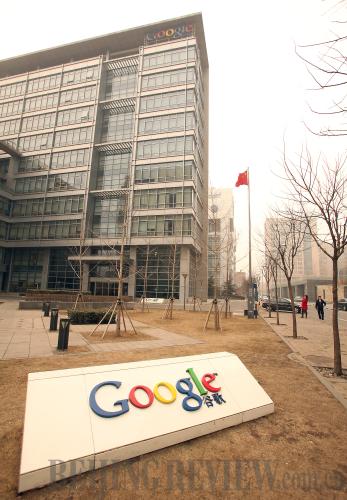|
 |
|
GOOGLE'S DEPARTURE: Google's Chinese headquarters in Beijing remains deserted after the company shut down its operations in China's mainland March 23 (CFP) |
Google Inc.'s retreat from China on March 24, after it ceased offering Chinese language-base search services from its mainland headquarters, leaves behind a market boasting more than 200 billion search requests and 10 billion yuan ($1.46 billion) in revenue annually.
Clicking Google.cn into the address bar now directs users to Google.com.hk for Chinese-language search services. But because of concerns over the stability of its services, many Google-loyal users will choose other search engines, providing new growth opportunities for Google's rivals in China, said Nelly Jin, a researcher with iResearch Consulting Group's industrial research department.
Google leaves a market share of around 30 percent, and many domestic Internet giants are hungry for a bigger piece of the market pie.
Best sauce
"I suggest you try Sogou's search services," said Zhang Chaoyang, Chairman and CEO of Sohu.com, on the heels of Google's withdrawal on March 24. Sohu owns the homegrown search engine, Sogou.com.
The same day, Sohu updated its Sogou Pinyin, an input software that facilitates fast and convenient input of Chinese into computer documents, to the latest 5.0 version. The new version, embedded with Sogou's search technologies, will help the search engine study the behaviors of Internet users while composing texts online. While various versions of Sogou Pinyin already accounted for nearly 90 percent of the Chinese input software market, the launch of Sogou Pinyin 5.0 will help expand Sogou's share of the search engine market.
Although Sohu has been investing in the Sogou search engine, it missed several opportunities for substantial growth in the past few years, said Zhang. He pledged that Sogou search would attach greater importance to the user experience this year.
So, too, will Microsoft with its R&D into a Chinese search engine.
"We believe the search market in China is the most important strategic market for Microsoft. Microsoft will continue to commit itself to the Chinese market," said an announcement on Microsoft's Chinese website on March 25.
Like Google, Microsoft set up its Search Technology Center in Beijing in 2005, to "gain a deeper understanding of what Chinese users need to be able to deliver the best product to them," said the announcement.
Microsoft is testing Bing Chinese, the Chinese version of Microsoft's latest search engine.
Another competitor in China's search engine market is Soso.com, owned by Tencent.com. Soso enjoys an advantage over other search engines—more than half of Chinese netizens use Tencent's instant messaging tool, QQ, forming a solid foundation for Soso.com's future expansion.
But whatever upgrades the above mentioned search engines are able to make, they won't be able to shake the lead held by Chinese search giant Baidu. As the main rival since Google Inc. set foot on China's mainland, Baidu has kept Google's expansion in check, allowing the American search engine to acquire no more than a 30-percent share since its entry in 2006. Baidu holds a 58-percent share.
And Baidu has by far been the biggest winner of Google's withdrawal. Google's stock prices took a 6-percent hit, a loss of up to $11.6 billion, since the company announced its potential withdrawal from the Chinese mainland in January 2010. Baidu's stocks, on the other hand, soared more than 40 percent. It was also the first time Baidu stock exceeded Google's.
Google prices closed at $553, down 0.81percent, while Baidu's went up 1.75 percent to $589.85 on March 25.
| 